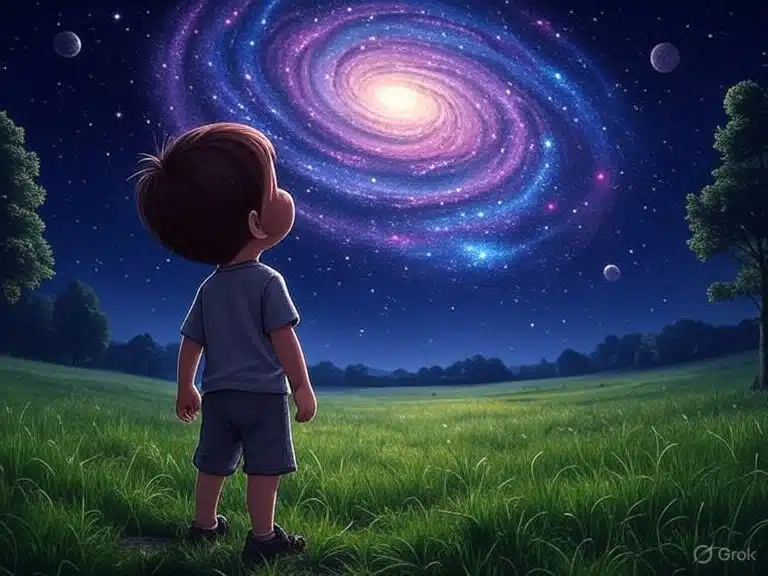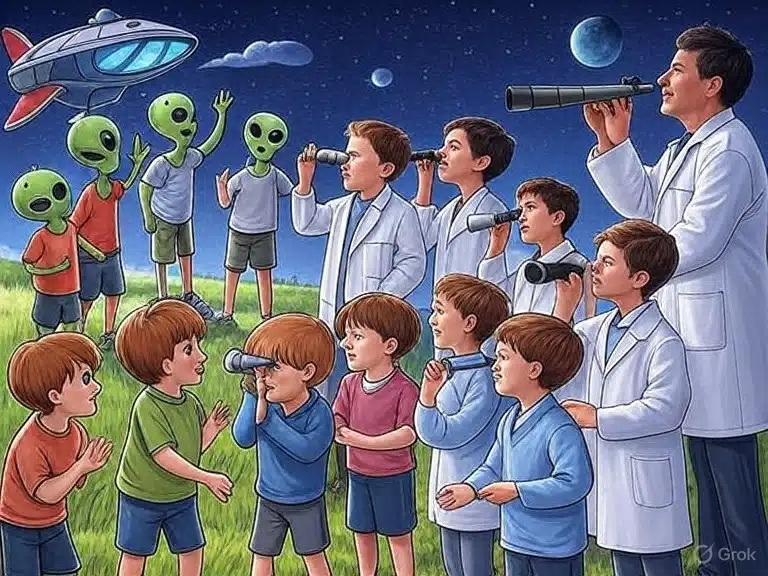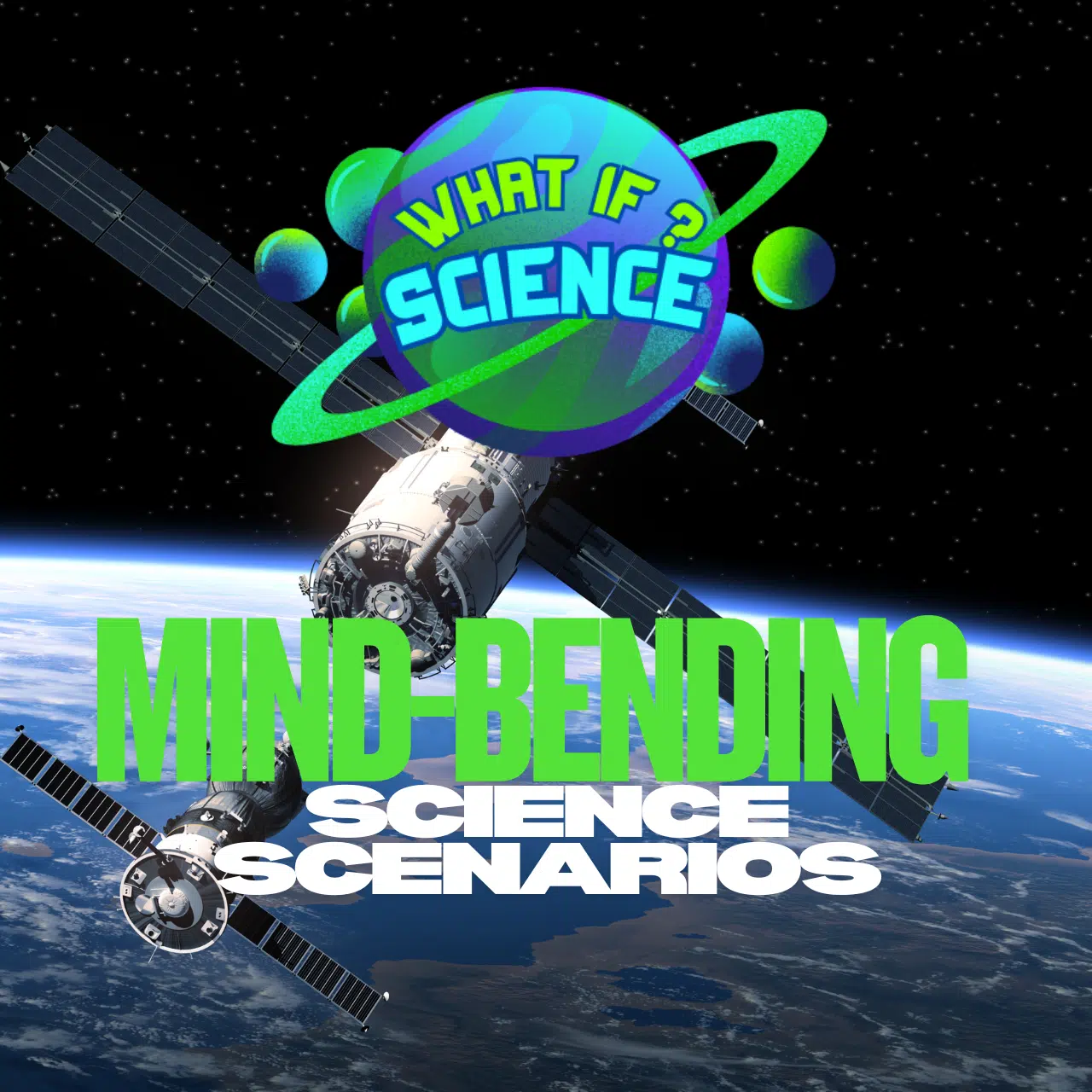A Question That Sparks Imagination
From cartoons to movies, from bedtime stories to science class, one question has always made children and adults wonder: “Do aliens really exist?”
Imagine looking up at the night sky and seeing billions of twinkling stars. Each star could have planets orbiting around it, just like our Sun has Earth. Could some of those planets have living creatures—maybe small bacteria, maybe strange animals, or maybe even intelligent beings with spaceships?
Let’s explore the mystery step by step and see what science says about aliens!
What Do We Mean by “Aliens”?
When we say “aliens,” we don’t just mean green creatures with big heads and antennas (like in cartoons). In science, aliens mean any form of life that does not come from Earth.
- It could be tiny microbes.
- It could be plants growing in alien soil.
- Or it could be advanced beings who can think, talk, and maybe even build technology.
So, aliens don’t have to look scary or weird. They could be very different—or surprisingly similar—to us.
The Universe Is Really, Really Big
To understand the possibility of aliens, we first need to know how big the universe is.
- Our planet Earth is part of the Solar System.
- The Solar System is part of the Milky Way Galaxy, which has about 100–400 billion stars.
- And guess what? There are trillions of galaxies in the universe!
If each star has planets, and even a small fraction of those planets can support life, then the chances of aliens existing become much higher.

What Makes a Planet Habitable?
Not every planet can have life. For aliens to exist, certain conditions are important:
- Water 💧 – Life on Earth depends on water, so scientists look for planets with liquid water.
- Right Temperature 🌡️ – Not too hot like Venus, not too cold like Pluto.
- Atmosphere 🌬️ – Gases that protect the planet and support breathing.
- Energy Source ☀️ – Usually from a star (like our Sun) to give warmth and power for life.
Planets with these conditions are called “habitable planets.”
Exoplanets: The Best Hope for Finding Aliens
Astronomers have discovered thousands of planets outside our Solar System. These are called exoplanets. Some exoplanets are in the habitable zone—the perfect distance from their star to possibly have life.
For example:
- Kepler-452b is sometimes called “Earth’s cousin.”
- TRAPPIST-1 system has several planets that might have water.
Scientists are super excited about these discoveries because they increase the chances of finding alien life.
Could Aliens Be Microbes?
When we think of aliens, we often imagine advanced beings with spaceships. But the truth is, the first aliens we find will probably be microbes—tiny life forms like bacteria.
- Microbes can live in extreme places like volcanoes, frozen lakes, and even deep inside rocks.
- If they can survive on Earth in such conditions, maybe they can survive on Mars or icy moons like Europa (around Jupiter) or Enceladus (around Saturn).
So, aliens might not wave at us—they might be microscopic!
The Search for Signals: Are Aliens Calling Us?
Scientists also listen for radio signals from space to see if intelligent aliens are trying to communicate. This project is called SETI (Search for Extraterrestrial Intelligence).
So far, no confirmed alien signals have been found. But the universe is huge, and our search has only just begun.
UFOs and Alien Stories
You’ve probably heard of UFOs (Unidentified Flying Objects). Some people believe they have seen spaceships in the sky.
- Some UFOs are just airplanes, balloons, or even weather tricks.
- But some reports remain unexplained, and that keeps people curious.
While science hasn’t proved aliens are visiting Earth, these stories fuel imagination and make us wonder even more.

What Do Scientists Believe?
Most scientists agree:
- Life probably exists somewhere in the universe because it’s just too big and full of planets.
- But intelligent, spaceship-building aliens may be rare.
- It might take many years, even centuries, to confirm if aliens are real.
Still, the idea that we are not alone makes space exploration even more exciting!
Fun Fact Box 🚀
- If aliens exist, they might not breathe oxygen—they could breathe methane or other gases.
- Some scientists think alien life might be made of silicon instead of carbon like us.
- NASA’s rovers on Mars are already searching for tiny signs of past or present alien life.
How You Can Explore the Alien Question
Even as a kid, you can join the excitement:
- Stargaze 🌟 – Use a telescope or binoculars to spot planets like Jupiter and Saturn.
- Read Space Books 📚 – Learn about galaxies, exoplanets, and life in space.
- Follow NASA & ISRO News 🚀 – Missions like Mars rovers and James Webb Telescope are looking for signs of alien life.
Conclusion: Could Aliens Really Exist?
The big answer is: Maybe yes!
The universe is unimaginably big, with billions of stars and planets. Life found a way to start on Earth, so it could start elsewhere too. Whether aliens are tiny microbes or advanced civilizations, the possibility is real.
For now, we haven’t found proof. But every time scientists discover a new exoplanet or explore another moon, we come closer to answering the biggest question in the universe: Are we alone?
So next time you look at the night sky, remember—you might just be staring at a planet where aliens are looking back at us, wondering the same thing!

